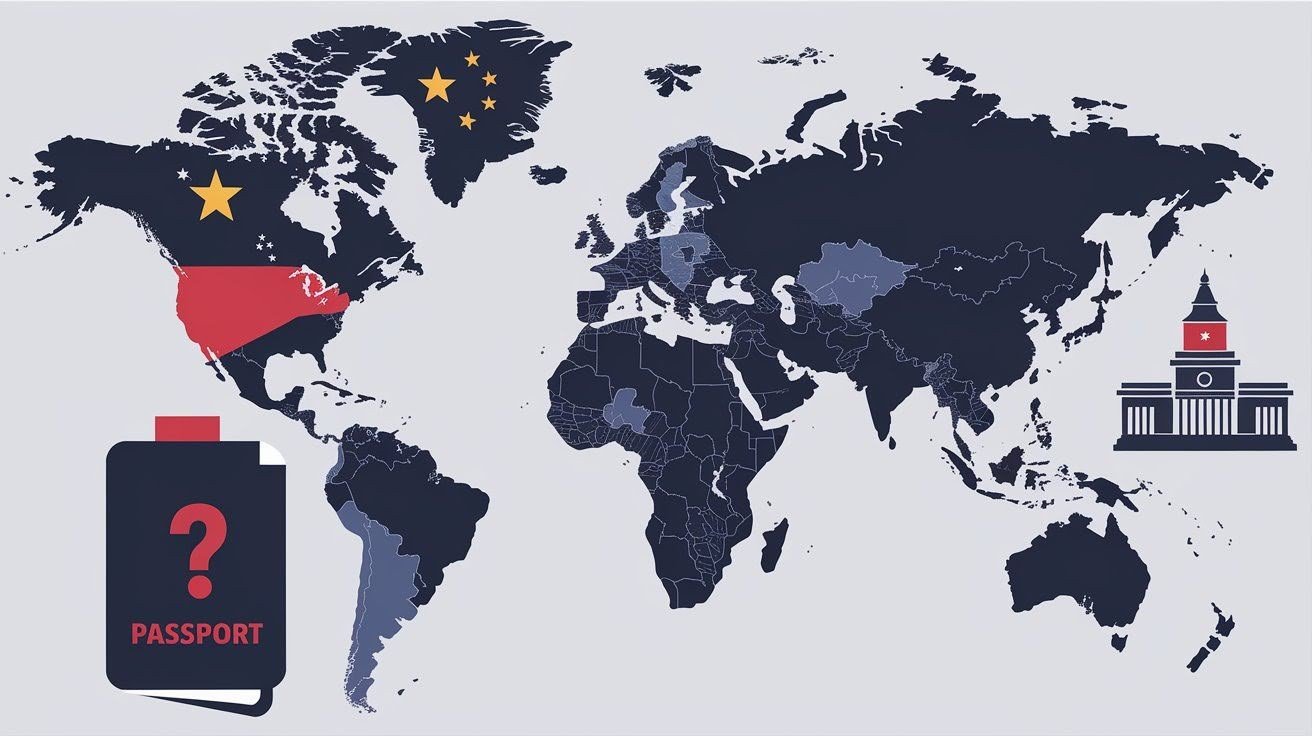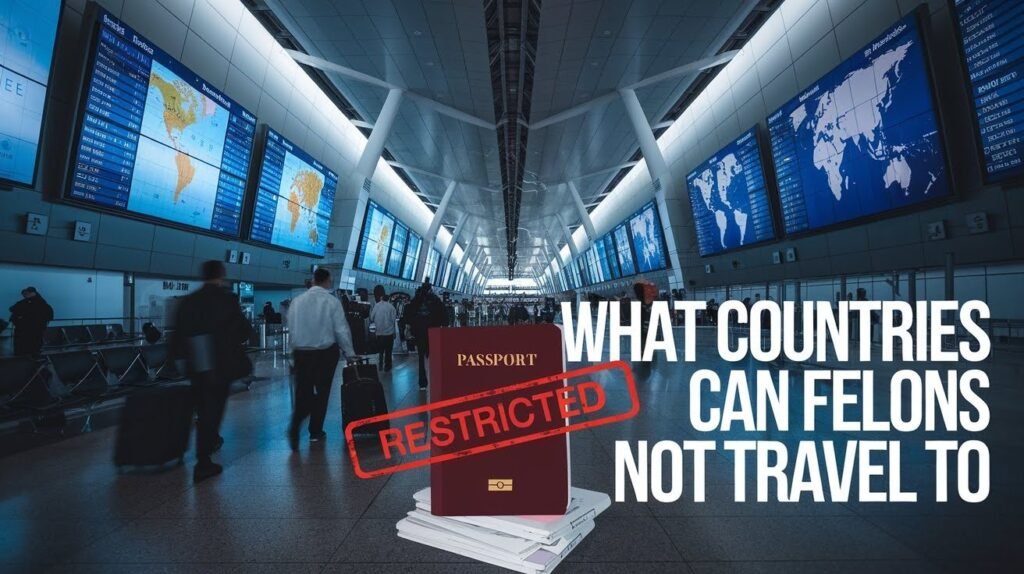Have you ever wondered if your past mistakes could stop you at the airport? Many people with criminal records face this reality every day. A felony conviction can create serious barriers when trying to visit other countries.
As someone who has researched immigration law and border policies extensively, I’ve seen firsthand how confusing these rules can be. Different nations have their requirements for who can enter their borders. Some countries check criminal backgrounds very carefully, while others are more flexible.
This guide is based on current government sources, embassy websites, and official immigration policies. The rules change often, so getting accurate, up-to-date information is crucial for your travel plans.
Which Countries Deny Entry to Felons?
These countries have the strictest rules and often deny entry to people with felony convictions.
Canada

Canada has some of the toughest immigration laws in the world. They consider any crime that could result in 10 years or more in prison as an “indictable offense.”
Even minor felonies can make you inadmissible to Canada. However, you may apply for criminal rehabilitation after completing your sentence and waiting period.
Japan

Japan typically denies entry to anyone sentenced to one year or more in prison. They also have zero tolerance for any drug-related convictions, no matter how old.
Unlike Canada, Japan does not offer a rehabilitation program. Once denied, your options for future entry become very limited.
New Zealand

New Zealand asks for a complete criminal history from all visitors. They have clear rules about who cannot enter their country.
You will be denied entry if you have received a prison sentence of five years or more at any time in your life. You also cannot enter if you have had a sentence of one year or more within the last 10 years.
Australia

Australia requires you to share your criminal history when applying for any visa. Immigration officers review each case individually.
Serious offenses often result in visa denial. The decision depends on the type of crime, when it happened, and your behavior since then.
Other Countries

China gives immigration officers the power to decide on entry for people with criminal records. The decision varies case by case.
Many Middle Eastern countries, like the UAE, may require special permissions or deny entry entirely. Always check with their embassy before planning your trip.
Why Do These Countries Restrict Felons?
Most countries create these rules to protect their citizens and maintain public safety. They want to keep out people who might commit crimes while visiting.
Border officers often have the final say on who enters their country. They can deny entry even if you have proper documentation, based on your criminal history.
Countries like Canada separate crimes into different categories. Minor crimes might not stop you from entering, but serious felonies usually will.
Countries with Lenient or Conditional Entry Policies
Many countries are more open to visitors with criminal records, especially for older or minor convictions.
Mexico
Mexico generally allows entry unless your crimes involved serious violence or drug trafficking. Most other felonies do not automatically bar you from visiting.
Border enforcement can be inconsistent, so experiences may vary. Some people report no problems, while others face questions about their past.
Schengen Countries (France, Italy, Spain, the Netherlands, Poland)
Most European Union countries in the Schengen area do not ask about criminal history during regular visits. They focus more on current security threats.
Exceptions include active warrants or very serious recent crimes. For most older felonies, entry is usually not a problem.
Other Friendly Countries
Countries like Ireland, Iceland, and the Czech Republic typically allow entry for people with criminal records. They focus more on current behavior than past mistakes.
Many Caribbean and South American countries also have flexible entry policies. However, always verify current rules before you travel.
Future Changes You Should Know
Starting in 2026, Europe will launch the ETIAS system, which will require background checks for most visitors. This could affect people with criminal records who previously had no problems visiting European countries.
More countries are starting to use digital systems that share criminal information between nations. This makes it harder to visit countries without them knowing about your past.
Technology improvements mean border security will likely become stricter over time. Planning and getting proper documentation becomes even more important.
Tips for Felons Traveling Internationally
Always research the specific entry requirements for your destination country before making any travel plans. Rules change frequently, and old information might not be accurate.
- Always tell the truth on visa applications and when speaking to border officers
- Consider applying for criminal rehabilitation programs when available
- Look into closed-loop cruises that start and end in the US if you cannot get a passport
- Contact the embassy or consulate of your destination for official guidance
- Keep documentation of completed sentences and rehabilitation efforts
Being honest about your past often works better than trying to hide it. Many countries appreciate honesty and may still allow entry.
Conclusion
Canada, Japan, New Zealand, and Australia have the strictest rules for people with felony convictions. These countries often deny entry and have limited options for appeal.
Even so, many other countries remain open to visitors with criminal records. Mexico, most European nations, and several other countries focus more on current behavior than past mistakes.
Based on years of research into immigration policies and real traveler experiences, the key to successful international travel is preparation and honesty. Always check official government websites and embassy information before booking any trip. With proper planning and accurate information, international travel remains possible for many people with criminal records.
Frequently Asked Questions
Can I travel internationally with a felony on my record?
Yes, many countries allow entry for people with criminal records. However, some nations like Canada and Japan have strict restrictions. Always check the specific country’s entry requirements before traveling.
Do I have to tell immigration officers about my criminal history?
You should always be honest when asked directly about your criminal record. Lying on visa applications or to border officers can result in permanent bans from that country.
How long do I have to wait after my conviction to travel?
This varies by country and type of crime. Some countries have no waiting period, while others require 5-10 years after sentence completion. Canada offers rehabilitation programs after 5 years for most crimes.
Will a background check show my criminal record at the airport?
Most countries can access criminal records from other nations, especially for serious crimes. Some countries check more thoroughly than others, but assume they can see your full history.
Can I get a passport with a felony conviction?
Most felons can get a U.S. passport unless they owe child support, have federal drug trafficking convictions, or are on parole/probation. Having a passport doesn’t guarantee entry to other countries, though.

